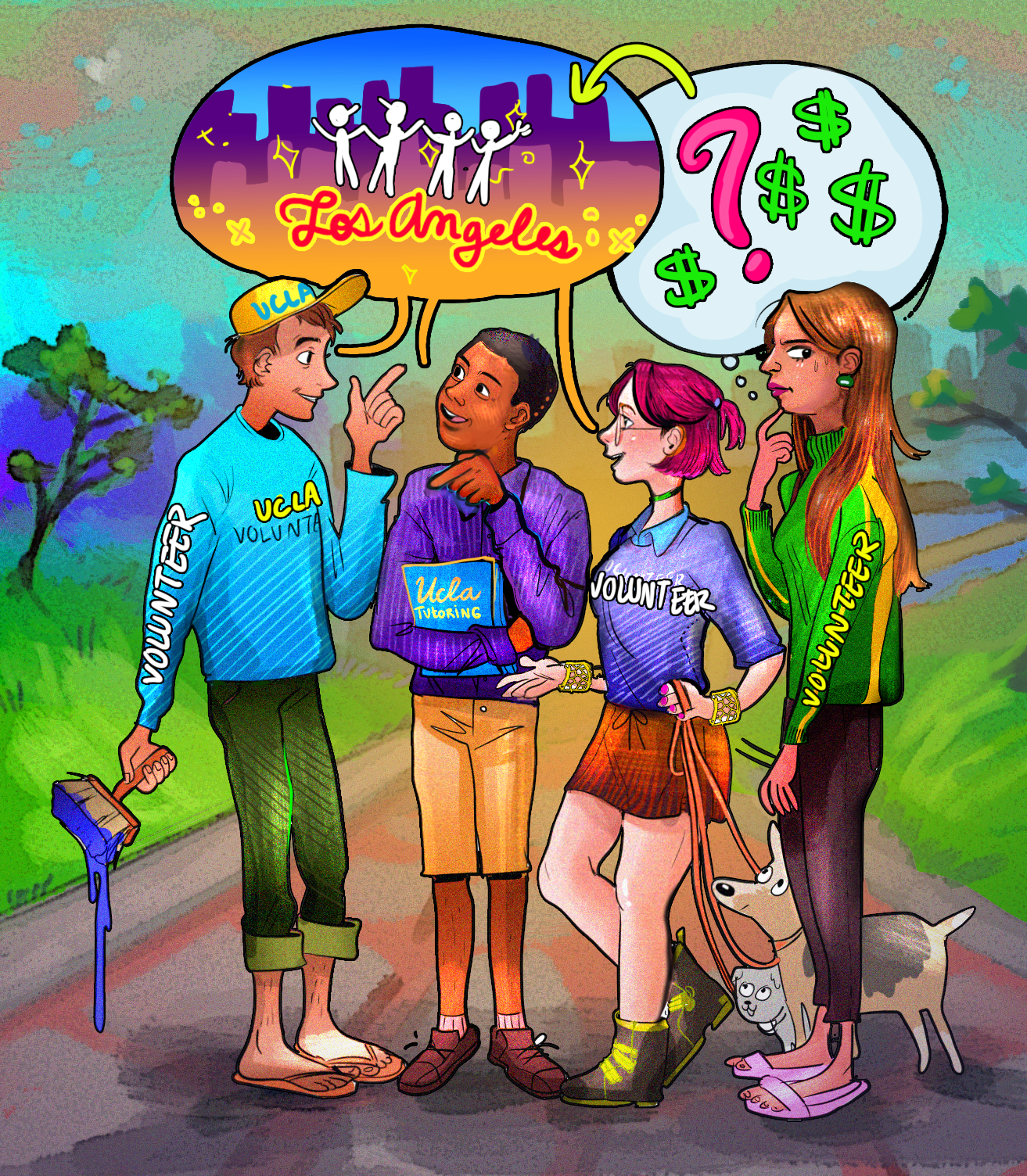Chris Busco: UCLA service groups must do work that actually benefits communities

By Chris Busco
Aug. 20, 2017 10:48 p.m.
“We the optimists.”
For years, these few, yet potent, words have fanned the flames of inspiration among thousands of eager incoming UCLA freshmen ready to conquer the world through community service and volunteering. And UCLA works hard to support this enthusiasm.
After all, there are 150 on-campus service organizations, both student- and university-run, and perusing the Campus Resource Funding Directory reveals myriad funding opportunities for campus organizations wishing to participate in community service and civic engagement. The message is clear: With an idea and a little bit of elbow grease, any Joe Bruin can obtain the resources needed to make an impact on the surrounding community.
At least, that’s what many students might think.
When dealing in outcomes that affect people’s lives, there is zero margin for error. Despite how appealing an idea may sound, its catchiness is not always a good measure of its efficacy. In fact, otherwise well-intentioned community service programs can have unforeseen negative effects ranging from an unwanted service for a community to higher criminal tendencies and lower job satisfaction rates among community members served.
While there are some safeguards put in place by different funding initiatives and organizations on UCLA’s campus, the university needs to impose a more stringent set of requirements governing all student organizations participating in community service and social intervention. Student organizations should be required to present credible research to demonstrate the efficacy of their work, and the Student Organizations, Leadership and Engagement office, which oversees all official student organizations on campus, must ensure organizations have a positive impact on the communities they interact with to guarantee funding is being used for only the most effective purposes.
Laura Abrams, chair and professor of the Luskin School of Public Affair’s Department of Social Welfare, said there are ways in which even the best-intentioned community service can go awry, including entering a community without truly understanding its needs, imposing a service that was not requested on a community and overpromising positive results while underdelivering.
And there have been several analyses that attempt to characterize these effects. For example, a landmark study by Richard Cabot, M.D., a Harvard professor, sought to examine the long-term effects of mentorship on at-risk, low-income youth in Cambridge, Massachusetts and Somerville, Massachusetts. The original study lasted from 1939 to 1945, and a follow-up of the study in the 1990s found the youth who received mentorship and other intervention were worse off than the control group on a number of metrics, including likelihood to commit a crime, job satisfaction and mental health.
Now, this does not mean mentorship is always ineffective. This study, however, is a clear example of how easily a seemingly good community service idea can have negative consequences. It demonstrates the importance of using research-backed community service methods to provide positive results.
This idea stands in stark contrast to many students’ idealistic notion that they can change communities for the better with just a plausible-sounding plan and the willingness to put in the work. Rather, only careful research and deliberate planning can ensure community service programs benefit those they intend to help.
Abrams said keeping community service from going awry is fundamentally about quality control. She suggested service organizations reflect and ask: Is the service meeting a community need? Was the targeted community involved in determining that need? Is the service working in the proper manner?
These are questions UCLA can help student groups answer. SOLE could ensure campus service groups maintain quality control by requiring that student organizations find legitimate academic research demonstrating the efficacy of the type of community service programs they want to engage in. This should be coupled with clear documentation of community need and involvement by all community partners involved. Additionally, student organizations should provide clear and comprehensive plans for internal review of their methods, and submit regular evaluations examining the benefits and failures of their programs.
Furthermore, UCLA could draw on its wealth of professional expertise and set up a panel of professors experienced in the social science behind implementing effective community service in order to review student groups’ registration applications and regular updates. This would help ensure only student organizations engaged in effective and beneficial community service are allowed to register with SOLE and, by extension, apply for available funding.
Of course, stringent requirements will turn some, perhaps many, away from creating new student organizations devoted to community service. The introduction of more red tape will certainly quell the flames of inspiration in some. However, it is more important to seriously evaluate the impacts of community service programs on people’s lives than to inspire undergraduates – who should be willing to put in the work required to execute their projects effectively.
And calling on busy professors to add this responsibility to their plates could be seen as an unnecessary burden. But in order to ensure the impact of UCLA’s community service-oriented student organizations is positive, these programs must be vetted by professionals.
Implementing these requirements will help to ensure that UCLA’s community service-oriented student organizations enrich, not diminish, the lives of many.
And despite how it may seem, that’s plenty to be optimistic about.


